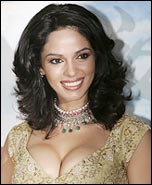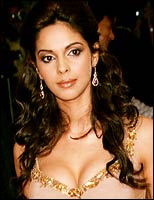 After Aishwarya Rai, it's the turn of Mallika Sherawat to go places.
After Aishwarya Rai, it's the turn of Mallika Sherawat to go places.
After making a spash at the Cannes and Toronto film festivals, the actress will be interviewed by CNN on Talk Asia. The show will be telecast on Sunday, September 25 at 4pm and 8:30pm.
Here's the first part of the chat transcript, where Mallika talks about Jackie Chan, her film The Myth and how she feels about being called a sex kitten.
Over to the host, Lorraine Hahn and Mallika:
LH: Hello and welcome to Talk Asia. I'm Lorraine Hahn. My guest today is Bollywood bombshell Mallika Sherawat, an actress best known among fans for bold, on-screen kisses and steamy sex scenes. Born Reema Lamba in 1981, in the conservative province of Haryana, she changed her name to Mallika Sherawat when she moved to New Delhi. She attracted attention there as a model, and was given her first movie role in Jeena Sirf Mere Liye. But it was 2003's Khwahish that catapulted her to overnight stardom. The movie explored pre-martial sex and a sort of controversial theme that would follow her career over the next two years. Her latest role sees her alongside Hong Kong action star Jackie Chan in The Myth, a movie that boasts an international cast and was screened at the film carnival festival earlier this year.
LH: Mallika, welcome to Talk Asia. Thank you very much for joining us. I wanted to ask you about The Myth. It's an adventure epic. Very different from the movies you normally have done. How did you hear about the role, how did you get it?
MS: Working with the most famous Chinese on this planet -- Jackie Chan -- was an incentive. I was also looking out for an international project when I got a call from a production house in Mumbai, saying that Stanley Tong, the director of the movie was in town looking for a fresh face opposite Jackie. She asked if I would mind auditioning. I went and met him, there was a little audition, he asked me a couple of questions and then, after a month they told me I was on. It was a big challenge. I had to do all the stunts on my own, I got bruised, I cried, I howled, I complained, I fought with Jackie but it all worked out beautifully in the end.
LH: So did he teach you any funky stunts?
MS: He taught me all the action secrets. (LH: Amazing.) All the action secrets I know now!
LH: How different was shooting The Myth compared to making a Bollywood movie?
MS: I would say, the working style is not very different, just why Myth has an edge is because it's a very big budget film, it's a $20 million production. They could afford better production values, everything was better. Otherwise, in terms of professionalism, it's all pretty much the same. But the whole world's going global now, you know, and the way to be is to be global. For that, you have to cast global actors.
LH: You did your own stunts -- how long did it take you to learn how to do them?
 MS: Flying around on cables and wires is not easy. I trained for a month with the stunt coordinator, with Stanley Tong, and with Jackie. All three of them helped me. There was a lot of stretching, I mean, now when I see the movie, I think, it looks so easy, it looks like a cakewalk. Hell no! It's not a cakewalk. It's a big challenge, you know, and I'm glad I took the challenge upon myself and did it. (LH: I know, I can just imagine.) Also, because in Bollywood, actresses don't get to do action at all, and here I was given a chance to play a character where I got to do a lot of action, I got to try that you know, so that was fascinating in itself. Back home, I'm used to doing movies that revolve around me, but here, I'm just doing a supporting role in the movie, just doing my bit and not having the burden of carrying the movie myself, you know.
MS: Flying around on cables and wires is not easy. I trained for a month with the stunt coordinator, with Stanley Tong, and with Jackie. All three of them helped me. There was a lot of stretching, I mean, now when I see the movie, I think, it looks so easy, it looks like a cakewalk. Hell no! It's not a cakewalk. It's a big challenge, you know, and I'm glad I took the challenge upon myself and did it. (LH: I know, I can just imagine.) Also, because in Bollywood, actresses don't get to do action at all, and here I was given a chance to play a character where I got to do a lot of action, I got to try that you know, so that was fascinating in itself. Back home, I'm used to doing movies that revolve around me, but here, I'm just doing a supporting role in the movie, just doing my bit and not having the burden of carrying the movie myself, you know.
LH: And what was it like at Cannes?
MS: It was great! A fantastic experience. I loved it, I couldn't believe it myself. It was my first experience of the film festival and when Time magazine said kind things about me, it felt great!
LH: Traditionally in Bollywood, female characters are portrayed as good and pure. Now, you have opened the doors to your work and have encouraged a lot of young actresses to be risky, to be what they want to. What made you decide to do this?
MS: It's just that traditionally in Bollywood, actresses are either portrayed as femme enfant, child woman, a femme fatale, or a vamp. They are not shown or portrayed as normal thinking women who can have grey areas, who can have likes and dislikes, who can feel passion towards somebody. It's not the done thing, but today with the Internet revolution, with the changing times, with the youth wanting to see more realistic cinema, I took it as a challenge, to play a realistic character. And that's why my movie Murder became the biggest hit of 2004 because people related to it, they related to the character. There was some truth in it.
LH: How difficult was it to break, you know, the old traditions. Was it difficult for you?
MS: Not really, for me. (LH: I mean, people talk behind your back.) Every character for me is the same. I give equal importance to every character I do, that's what's more important, whether this character has so many kisses or that many steamy scenes is not important. It's like every other scene, we're all professionals here.
LH: So it wasn't emotionally or physically challenging for you initially.
MS: You do feel shy, and my co-star had onions. (LH: Onions!) Imagine just before an intimate scene, he had onions. It was awful. It scarred me for life.
LH: Your critics would argue that you have used your sex appeal instead of talent to get to where you are now. What do you say to them?
 MS: Jackie Chan used his kung-fu skills to get where he is, Arnold Schwarzenegger used his muscle. Every actor uses his or her own unique selling point to establish herself and if I used my sex appeal, what's wrong with it?
MS: Jackie Chan used his kung-fu skills to get where he is, Arnold Schwarzenegger used his muscle. Every actor uses his or her own unique selling point to establish herself and if I used my sex appeal, what's wrong with it?
LH: People have called you a sex kitten, or a sex icon. Is that a flattery or an insult to you?
MS: I'm not even bothered, you know. I see it as a side-effect of what I do, what I'm really interested is in doing good cinema, sourcing good scripts, working with competitive and challenging directors with good co-stars. That's what my main aim is. I'm not concerned with all these sexy images or what people say, what critics say. It's not important to me at all.
LH: What kind of roles do you really like to do now?
MS: I love Southeast Asian cinema. I'm a big fan of directors like Zhang Yimou, Wong Kar Wai, Chen Kaige, Stanley Tong, Suhar, Ringo Lam, there are so many actresses like Gong Li, Anita Mui who are so inspiring. I would love to work with them and do cinema like that.
LH: As far as Indian cinema goes, do you see it changing now?
MS: Yes, it is. With younger filmmakers coming in, and also with Hollywood influencing it a lot, cable TV just dominates everything. I would put it this way -- if Indians want, if we want other cultures to like us, we have to embrace other cultures as well. It has to be a healthy mix and that's what's happening now. The younger generation is less hypocritical and more realistic in their approach. (LH: Right, which translates into the kind of movies you see now in Bollywood.) That's right.
LH: Mallika, we're going to take a very very short break. When we come back, Mallika talks about growing up in a small conservative town. Stay with us.
Don't miss the second part of the chat transcript on Monday, September 26.
Courtesy: CNN
Photographs: Getty Images








